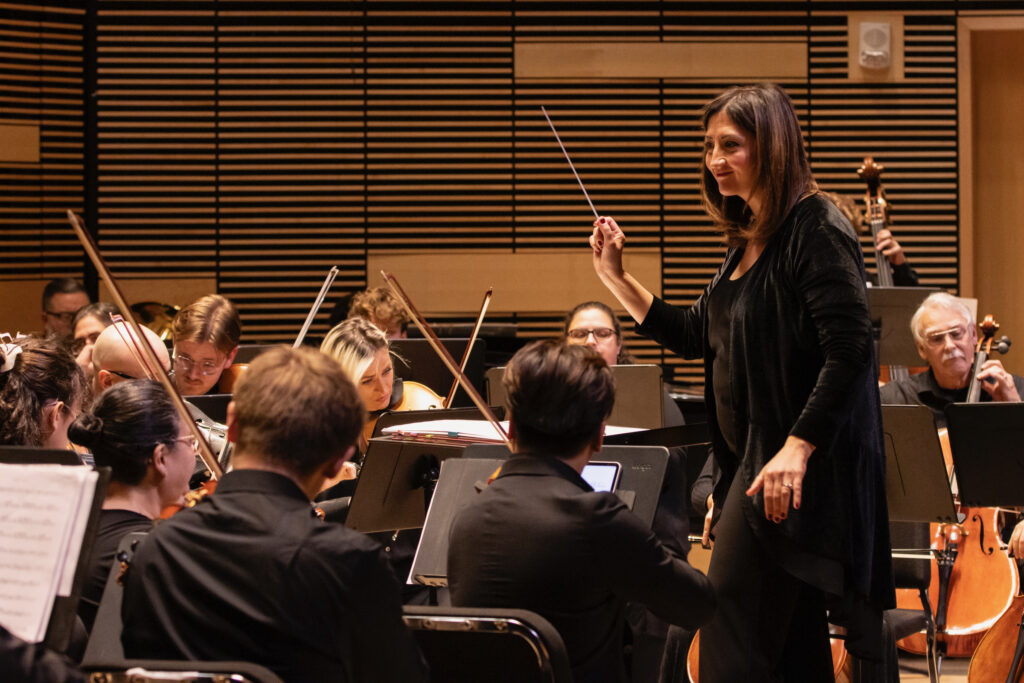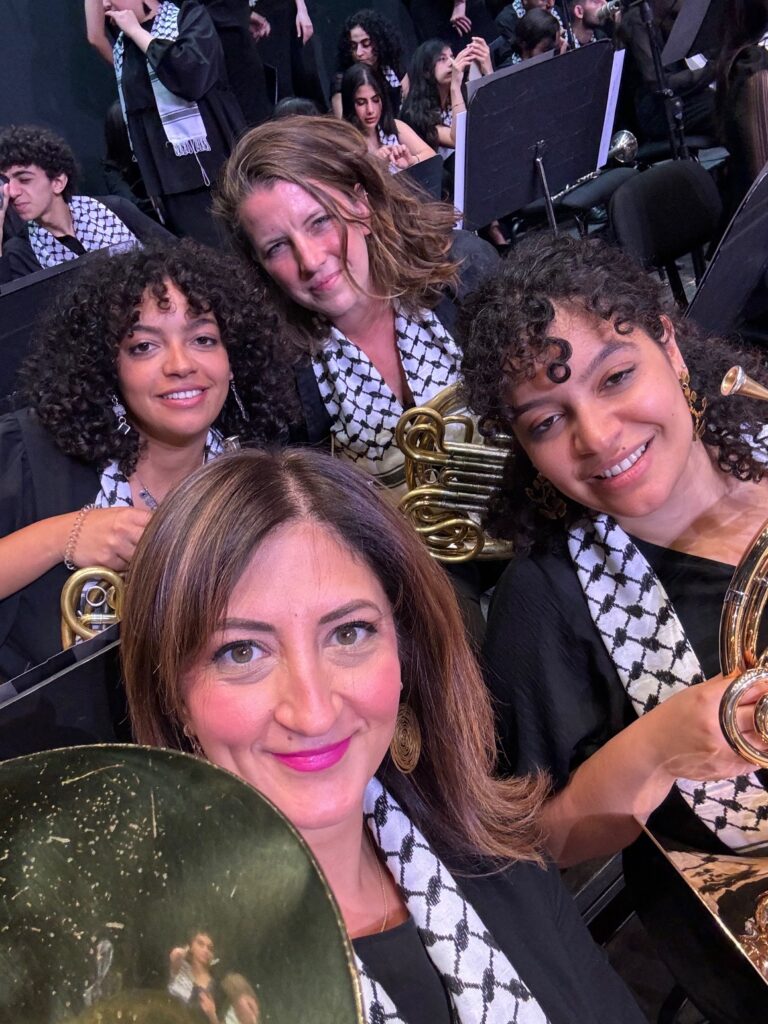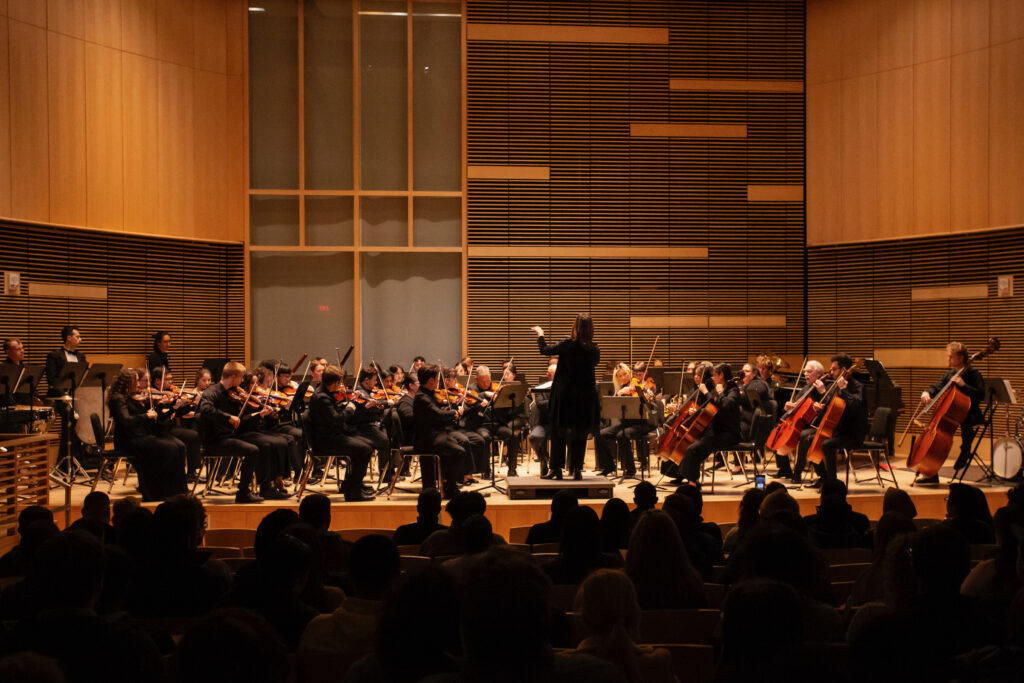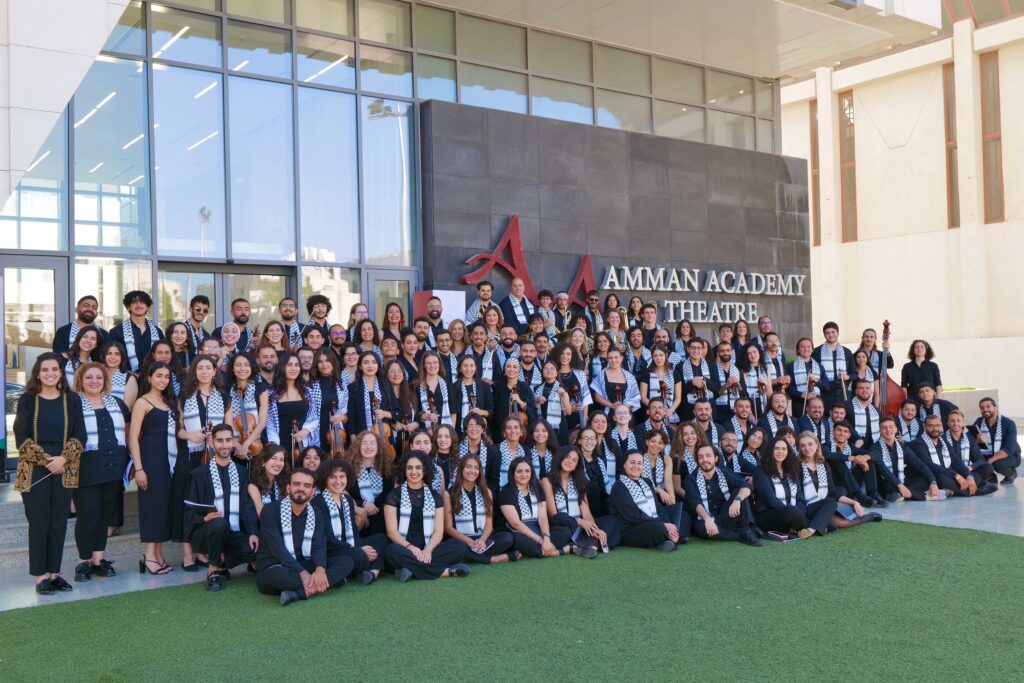"Music as an Escape": 40 Minutes with Sommer Forrester

By: Layan Srour / Arab America Contributing Writer
Sommer Forrester’s journey through music and identity is one of blending cultures, disciplines, and personal resilience. Sommer is an associate professor at the University of Massachusetts, Boston, where she leads the music education program. Raised on a rich tapestry of Arabic music and Western classical influences, she has carved a unique path in both academia and performance. From her leadership in orchestras to her dedication to Palestinian voices in music, Sommer’s work challenges boundaries and fosters connection across cultures.
How was music a part of your upbringing?
My father is Palestinian and my mother is of German descent. When I was growing up, music was a huge part of my life. My great-grandmother was always listening to music and she was in theater productions. There was a strong female presence of theater on my mother’s side, but it didn’t get passed down to my grandmother or mother. Ironically, my dad can’t hold a tune, and it’s something we laugh about all the time, but he was always playing Arabic music, like Fairouz and Farid Al Atrash. Before we had our own iPods, we listened to whatever Baba was listening to on long car rides. As he got older, he became more involved with Islam, and he would listen to the Quran.
As a kid, I would send cassette recordings to my sitti (grandmother in Arabic) made with microphones taped together. She didn’t speak English, but I would say hello to her, and I would tell her all about my exciting life as a six-year-old. Then, I would sing her folk songs or 1950s Arabic pop music that I learned by rote. My maternal grandmother always said, “Sommer has a head full of songs.” I was always singing in English and Arabic. It’s no wonder I ended up having a foothold in music.
I was born and raised in Toronto, Canada. As a child, we went back to the Middle East often. I was immersed in these cultural spaces where there was a lot of music. In school, I was in band, orchestra, and musical theater. Music was just always a huge part of my life. When I began high school, I became more serious about playing the horn.

What inspired you to professionally pursue music?
I had a pretty eclectic upbringing, which I think is important to highlight. When I began university, I was a little ashamed of it, to be honest. I didn’t grow up heavily in the classical world. My musical role models were my teachers in high school. When I found classical music, I fell in love with it. I was the only person in my family who really loved it, so I felt like a really big outsider there.
Do you incorporate any cultural elements into your teaching?
I don’t, but everybody in the orchestra knows what I mean when I say, “Yalla habibi!” They just know that that’s Arabic for “hurry up, let’s go, honey”. It’s so ingrained in my being that I think it’s a lens through which I see so many things and that it doesn’t even strike me as being Arab.
It was my fourth year of undergrad when 9/11 happened. I didn’t want people to know that I was Arab and I wanted people to just think that I was like them. So, I doubled down on classical music and tried to change the way I looked and everything. At that time, if you said you were Arab, there was an assumption that you either didn’t know anything about classical music or the only thing you wanted to play was Arabic music.
As a leader of an ensemble, I welcome everyone, and I don’t make assumptions. I allow them to tell me who they are. I don’t know if that’s Arabness or if that’s just the result of living with an Arab identity, but I think it’s a combination of both. Going back to the Middle East feels like having one foot in Western culture and one foot in Middle Eastern culture. I bring that openness to my work.
Did you struggle with identity as an Arab in America?
I’ve never felt included. First, my mom’s not Arab. I remember going to Arabic school—kids talked about my brother and me because my mom was not Arab. Even with my family, she’s the only non-Arabic speaker. I saw how she was an outsider. Socially, I didn’t have any Arabic friends, but I had my family. When I went into classical music, there weren’t a lot of Arabs there either. It’s always felt like a part of my life but not integrated into my everyday life.
My Christian friends didn’t understand why some things were haram (sin). There were things that I wasn’t doing that they were allowed to do. It’s hard to notice these differences. But then again, these weren’t my mom’s rules, they were my dad’s. I struggled with that part of my identity and culture as well. I’m really proud of my culture and my background, but it feels limiting everybody else gets to do this cool thing and I can’t because it’s haram, and people on the other side of the world might “judge my dad”. It’s complicated growing up with that.

Why do you think a lot of Arabs aren’t in musical academia or classical music spaces?
I think, particularly with Palestinians, the role of education is leverage and social currency. It’s not just about you. You’re going to school to become a doctor, lawyer, or dentist because that has prestige. Having that prestige means that your family does too. There’s this kinship to caring for your family as well.
Music is such an integrated part of the culture. It’s present at every cultural event, wedding, and gathering. There’s music that’s passed down through tradition, yet it’s not necessarily something you study formally in school. In privileged places in North America, you go to school to discover something about yourself. In the Middle East, you go to school to become something. “You want to go discover yourself? Go take a walk, habibi. You’re going to spend four years in school and thousands of dollars to discover yourself? That’s not happening.”
Were your parents supportive of you going into music?
Not initially, no. Is anybody’s? I don’t think that’s an Arab thing.
What’s a cultural or musical story that stuck with you?
I was inspired to spend time asking sociological questions about Palestinian society and Arab society. When I went back to Palestine and saw the kids, I thought the same questions. Do they get to do music in school? Where are their opportunities? That’s me bringing in a Western lens into a different place, which is problematic. And I see that now. That was my 20 year-old-self thinking that I knew everything.
But now, I use music as a way to connect with different parts of different communities in Palestine, particularly in the West Bank through the Edward Said Conservatory of Music, and get to know musicians and teachers within Palestine. Music in the arts is thriving in ways that might not seem replicated here in North America, but they are, in fact, thriving. Music is an incredible asset to those communities.

Have you found any challenges as an Arab musician in these spaces?
Yes, and no. I’m very careful with who I share my background, and it’s a tough decision to make. It says it in my bio, if people ask, it’s there, and I will have conversations about it, but I’ve had to make some hard choices. After October 7th, I had to understand how to show up, and I proudly wore my kuffiya. I work in a minority-majority school, so, I’ve never felt a risk in the ways that some of my colleagues have experienced at other institutions. I’m also in the arts, so I think it’s different when you’re in political science or other areas of study.
I think the biggest area where I felt the impact of discrimination is rejection from publishers. I’m currently working on a book about Palestinian women musicians, and after October 7th, I kept hearing “Thanks, but no thanks, maybe under different circumstances, but we’re not touching stories around this right now”. I’m happy to report that I do have a publisher that I’m working with and I’m very grateful for that.
That being said, have I been a part of every protest on the campus? No, and it’s not because I’m not an ally, but because I had to choose for myself. There were times when I felt like I couldn’t put one foot in front of the other when I was immersing myself in those spaces. I decided that how I wanted to show up for my community was through my work. My work is based on uplifting and highlighting the voices of women whose voices would otherwise be silenced. By working with the Edward Said Conservatory this summer as a music instructor with the Palestinian National Youth Orchestra in Jordan, we performed concerts that were sold out for two nights to raise money for Gaza.
How did the genocide affect your ability to create music?
I use music as an escape. I remember going up in front of the group and speaking to them about humanity broadly. When you’re in a position, as a conductor or educator, you have to remember that you are a leader to all.
It’s hard to get up in front of the group in those situations. My son plays music in a preparatory program at the conservatory here in Boston. A lot of the people in his classes are Jewish-Americans, and they know that I’m Palestinian. The day after October 7th, a Jewish mom came up to me. We just looked at each other and we didn’t know what to say. She just looked at me, hugged me, and said, “This is a humanitarian crisis.” I remembered that incident standing in front of the orchestra a few days later. I wondered if there are people in the orchestra who, for the first time, are learning about what happened in Palestine for over 75 years, not only on October 7.
There are people in my ensemble, who for the first time are probably looking at me differently because they know I’m Palestinian. It’s my job to show up and show them that I’m the same person. I’m the same person who was here before October 7th, and I’m going to be the same person after October 7th in terms of what I’m going to do. We’re here to make music together.
I used music as an escape in many ways, but I’ve also used music as a way to remind myself that I am not defined by sociopolitical events that happen in the world. Those events don’t define my culture, and they certainly don’t define me, my capacity, or my ability to do my job.
What advice would you give to Arab Americans aspiring to enter the music world?
Go for it. We need your voice, your creativity, and your sounds. Go for it.
Sommer is currently working on a book, Women Unsilenced: Hope, Freedom, and Music in Palestine. This book explores how Palestinian women use music to express, protest, and celebrate their identities. Their harrowing accounts of daily life chronicles the untold stories of women living under military occupation and patriarchal oppression. Their individual and collective stories challenge dominant narratives about Palestinians and women in the Middle East, thus disrupting assumptions that are rooted in settler-colonialist and imperialists narratives. Women Unsilenced: Hope, Freedom, and Music in Palestine is a triumphant memoir of grace and resilience that people everywhere can relate to. The stories of these women are beacons of hope, celebrating the universal value of self-determination.
About the Article and Author: Layan Srour, a Lebanese musician based in Detroit, Michigan, is passionate about blending her culture through music, research, and education in the United States. 40 Minutes With is a weekly feature where Layan interviews an Arab American musician, exploring their journey through music and culture in America. Connect with Layan on Instagram, Facebook, LinkedIn, or via email.
Want more articles like this? Sign up for our e-newsletter! Check out our blog here!








